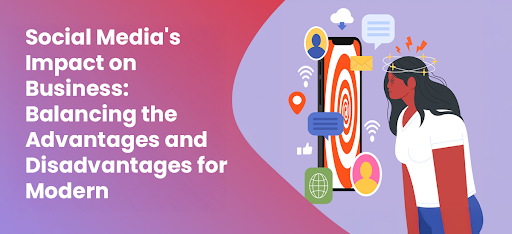Social Media and Business: Finding a Balance of Pros and Cons for Today’s Entrepreneur

Social media has completely transformed the world of business. Social media gives free publicity to the product offered by the businesses. The same enables interaction with the customer base, increasing the visibility of brands. This, for an entrepreneur, allows reaching their target market without too much spending on advertisements and other marketing channels traditionally pursued.
Why Social Media Matters for Businesses Today
Social media levels the playing field among small enterprises where they can compete with such big brands because they do not have deep pockets for significant marketing budgets. However, it is fine-tuning marketing initiatives on a mass scale corporation to better take care of customers.
The organization has to look at the opportunity by considering attendant risks to get the right mark in exploiting the potential of social media.
Social media and its benefits to small business marketers
1. Cheap marketing with excellent return on investment
Social media marketing does not resemble other traditional forms of advertising since it provides full returns on a minimum input. Organic reach is much stronger if enhanced with targeted paid advertising; hence, businesses can reach the preferred target audiences and have excellent returns.
For instance, a small apparel firm can put up its outfits on an Instagram account, utilizing influencer collaboration and shopping posts to sell for a fraction of the cost of a billboard or a TV advertisement.
Why it matters: Social media enables any business to tap into the influence of high-impact marketing.
2. Accurate Targeting for Increased Engagement
Advanced data analytics allow businesses to tailor content and ads to a specific target audience based on demographics, interests, and online behavior. Social media allows brands to fine-tune their reach, as opposed to the broad audience segmentation in traditional media.
For example, with marketing tools, a fitness start-up can run its ads targeting users who may have shown interest in health and wellness. This way, marketers reach the potential customer rather than targeting any random audience.
Why it matters: It will allow the companies to spend more relevantly on ads and get more engagement through the exact targeting of the audience.
3. Improved Customer Service and Interaction in Real-Time
Social media has dramatically changed the way of the customer care interaction with firms directly and the customers. Business can promptly answer questions, solve complaints, and post updates on different matters
For example, a restaurant can react instantly to poor service reviews on Twitter by indicating that it is very responsive and is concerned about the quality of service.
Why it matters: Clear and transparent communication creates a good customer’s confidence and loyalty.
4. Social Media Branding through Continued Interaction
A brand will develop stronger brand identity and customer trust by posting relevant content and showing interaction with followers, as well as publishing customer testimonials on social media. It enhances the credibility of a brand.
For example, a technology start-up can use LinkedIn to help establish their thought leadership by publishing industry insights, case studies, and success stories.
Why it matters: A business can shape public opinion while reinforcing brand value through social media.
5. Consumer Insights and Market Trends
Social media enables the company to receive instant feedback about consumer behavior, preference, and emerging market trends. Based on engagement metrics and interactions with customers, brands can align their strategies with market demands.
Why it matters: Businesses who track the social media wave, can make effective decisions based on data, so that sales can be improved with satisfaction.
Social Media Dangers for Business
Social media comes with great opportunity but also comprises some risks and a business should handle them pretty well.
1. Reputation Difficulty
The same speed that helps companies reach customers can also amplify adverse word-of-mouth. A single misstep, whether it is a poorly worded tweet or a customer complaint going viral, can damage the reputation of a brand.
As evidenced by the recent controversy of the brand introducing a new advertising campaign, a company can face a serious slump in customer trust within a very short period.
Management: Companies need to be very prepared with their crisis response plan to address issues on social media.
2. Time-Consuming Effort with No Overnight Results
Organic growth doesn’t work overnight; it needs effort and content creation, while paid ads result overnight. Even a new company launching a Facebook page does not get much attention overnight, even though after several months of regular posting and audience engagement, its page might pick up the traffic.
How to deal with it: Organizations must plan the content calendar in advance and use scheduling tools without clogging the workforce resources.
3. Privacy Issues and Data Security Threats
Businesses are also becoming increasingly worried regarding the safeguarding of customer data through each social media engagement as it gathers consumer information. All the breach cases can reveal a customer’s private information that eventually causes reliability issues and fines from the authorities.
For example, a retailer whose security systems are poor would lead to leakage of its database and the resulting data breach; it may lose customers and may face lawsuits as well.
The way forward: Companies should focus on cybersecurity; they need several data protection policies and should comply with regulations too.
4. Algorithm Dependency and Reduced Organic Reach
The visibility from the algorithms of the social media is in the hands of content, and within this, the business has to change itself to suit every updated requirement of the platforms; hence, organic reach has been lowering throughout the years, making it harder to reach audiences without having to pay for it.
For example, an online business that is accustomed to receiving free traffic using Facebook, suddenly faces an update of the algorithm that reduces organic post visibility.
The way to overcome: Marketing on multiple channels and paying money for advertisements precisely counterbalances this effect of algorithms.
5. Social Media Fatigue and Saturation
The more businesses flood the airwaves and social media platforms, the more social media fatigue causes audiences to disengage.
An over-posting skincare brand on Instagram will not get as much return because people become disengaged.
How to control it: Brands should post with quality rather than quantity, which means keeping their content very interesting and relevant.
Finding the Sweet Spot
Social media is an absolutely essential marketing tool; however, relying on its advantage is balanced with its disadvantage. The entrepreneur needs to:
- Utilize cost-effective strategies to maximize ROI.
- Emphasize organic engagement overactive promotion.
- Track customer service conversations and engage professionally.
- Update the platform’s status and alter.
- Incorporate effective data security measures so that the trust of the information with the customers is possible during the use of social media.
Conclusion: The Future of Social Media in Business
Social media will continue to evolve, bringing new tools and challenges to businesses. Its benefits—targeted marketing, direct engagement, and real-time insights—are invaluable, but businesses need to be responsive to changing trends and consumer expectations.
Today’s entrepreneurs are supposed to seize the opportunities of smart use of social media while being abreast of its pitfalls. Through these established connections, businesses develop memorable customer experiences and thrive in the digital space.
